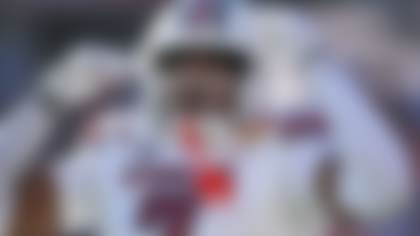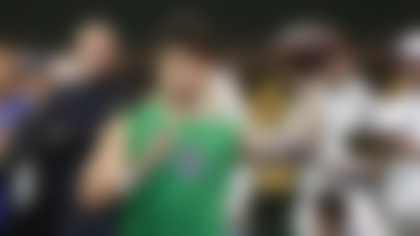The National Football League has outlined for NFL players, coaches, and staff members the recent steps that have been taken to address the management of concussions in the NFL.
"We want to make sure all NFL players, coaches and staff members are fully informed and take advantage of the most up-to-date information and resources as we continue to study the long-term impact of concussions," Commissioner Roger Goodell said. "Because of the unique and complex nature of the brain, our goal is to continue to have concussions managed conservatively by outstanding medical personnel in a way that clearly emphasizes player safety over competitive concerns."
The recent steps were outlined in a memo that will be sent to all NFL players and team personnel with other information. They include the following:
· The NFL held a medical conference in June on the subject of concussions. It was attended by team physicians and athletic trainers from every NFL team and by active players and medical representatives of the NFL Players Association. The conference reviewed the current medical and scientific research and included presentations by doctors and scientists from within and outside the NFL.
· An informational pamphlet on concussions for NFL players and their families has been prepared (below). It describes the symptoms of concussions, what NFL players should look for in themselves or a teammate if they suspect a possible concussion, and what NFL families should know about concussions.
· The establishment of a hotline to report information on a confidential basis about an NFL player being forced to practice or play against medical advice. The hotline underscores the league's priority on player safety over competitive concerns.
The NFL and NFLPA medical advisors prepared a summary of key factors in deciding when NFL players can safely return to the same game or practice. These factors have been identified in medical studies and are used by NFL team medical staffs. They emphasize that concussions in the NFL should continue to be managed conservatively and include the following specific points:
1. The player should be completely asymptomatic and have normal neurological test results, including mental status testing at rest and after physical exertion, before returning to play.
2. Symptoms to be taken into account include confusion, problems with immediate recall, disorientation to time, place and person, anterograde and retrograde amnesia, fatigue, and blurred vision.
3. If an NFL player sustains a loss of consciousness, as determined by the team medical staff, he should not return to the same game or practice.
4. NFL team physicians and athletic trainers will continue to exercise their medical judgment and expertise in treating concussions, including considering any history of concussions in a player.
· Neuropsychological testing has been expanded for all NFL players. NFL players who have been removed from a game due to a concussion will be re-tested during the season as part of the medical staff's treatment of the player and to assist in determining when players can return to practice and play. Each club will select the neuropsychological testing provider of its choice.
· Player safety rules relating to the use of the helmet will continue to be closely enforced. This will include strict enforcement of the requirement that chin straps on helmets be completely and properly buckled so that the helmet provides the maximum protection.
· The NFL will continue to research and study all elements of concussions with a particular focus on long-term effects.
BELOW IS AN EXCERPT FROM THE NFL PLAYER CONCUSSION PAMPHLET:
What is a Concussion? It's More Than a "Ding."
Concussions are caused by a hard hit to the head. The hit is typically from another player's helmet, shoulder pad or knee or from a fall to the ground. The effects usually last a short time, but it's important that they are treated properly and promptly by you, your team doctors and your athletic trainers.
You shouldn't decide if it is just a "ding." Instead, you should report any symptom from the list below to your medical staff. This will help determine whether or not you have had a concussion.
"Ding" is not a medical term. It doesn't describe specific symptoms and won't help your medical staff. Try to describe your symptoms from the following list.
How do I know if I have had a concussion?
These are some of the symptoms you may experience immediately or within a few days of having a concussion. Every concussion is different, players may react differently and not all players will experience the same symptoms.
The most common symptoms are:
· Imbalance: You may feel a change in your sense of balance, feel dizzy, or unsteady on your feet.
· Headache: This is the most common symptom with concussion. It may be mild to severe in intensity and you may feel like there is pressure in your head. This may be accompanied by nausea and vomiting.
· Confusion: You may be confused about where you are, about a play, the score or game situation. You may not remember the play you are running.
· Memory loss: You may lose memory about things that happened BEFORE or AFTER you were hit. You may not remember what happened during the play or the quarter before your collision. Or you can't remember what happened on the field or on the sidelines after your hit. You may ask the same questions over and over again.
· Loss of consciousness: You may black out or get knocked out, even for a second or two.
· Vision change: You may become sensitive to light, have blurred vision, double vision or feel like lights seem brighter. Some athletes also report "seeing stars" or other objects following a hard hit.
· Hearing change: You may feel a change in your hearing so sounds suddenly seem very loud, or you may hear a high pitch tone in your ears.
· Mood change: You may have a sudden change in your mood or a teammate may notice a change in your mood following a collision. For example, you might suddenly start to laugh or cry for no reason. You may not know this is happening but teammates, coaches, or the medical staff may see it. After a game, you may feel more irritable, anxious, or cranky than usual.
· Fatigue: You may feel more exhausted than usual after a game when you had a hard hit to the head. Some athletes report that they need to sleep many more hours after a concussion.
· Malaise: You may just "not feel right" but can't point to a specific problem.
Not every hard hit to the head leads to a concussion and whether or not you have a concussion can only be determined by your team doctors and athletic trainers. If the team medical staff does not know that you are injured, it can't help you!
You may not always recognize your symptoms. But your teammates, coaches or family members may see a difference in you that you don't. If someone sees a change in you, take it seriously and report it to your team medical staff.
What should you report to your team medical staff?
Don't try to make a diagnosis yourself. A concussion needs to be diagnosed by your team medical staff. If you have had a hard hit to the head and have symptoms, you should immediately report your symptoms to your team doctors and athletic trainers, who will conduct a thorough evaluation on the sideline.
On occasions, symptoms from concussion will be more obvious or noticeable hours after the impact. Symptoms should be reported to your medical staff regardless of when you become aware of them.
If you see any symptoms in a teammate, tell your team doctors or athletic trainers because your teammate may not always realize he has had a concussion.
When should I return to play following a concussion?
After a concussion, all return-to-play decisions should be made by your team medical staff. These decisions should never be made by players or coaches. You should be free of symptoms before you return to play.
If you have had a concussion and feel you are being pressured to return too quickly, or think that is happening to a teammate, you can call (the hotline number) to make a confidential report.
Am I at risk for further injury if I have had a concussion?
Current research with professional athletes has shown that you should not be at greater risk of further injury once you receive proper medical care for a concussion and are free of symptoms.
If I have had more than one concussion, am I at increased risk for another injury?
Current research with professional athletes has not shown that having more than one or two concussions leads to permanent problems if each injury is managed properly. It is important to understand that there is no magic number for how many concussions is too many.
Research is currently underway to determine if there are any long-term effects of concussion in NFL athletes.
What is the treatment for a concussion?
The treatment for concussion usually consists of rest. Medication may sometimes be prescribed by your team doctors for symptoms such as headaches and dizziness. If your team doctor prescribes medication, be sure to follow his directions and those provided with the prescription.
It is important that you avoid drinking alcohol. Also, if you intend to use over-the-counter medication, vitamins or supplements, tell your team doctors. They may want you to stop taking them.
You should avoid caffeine and make sure that you do not become dehydrated.



